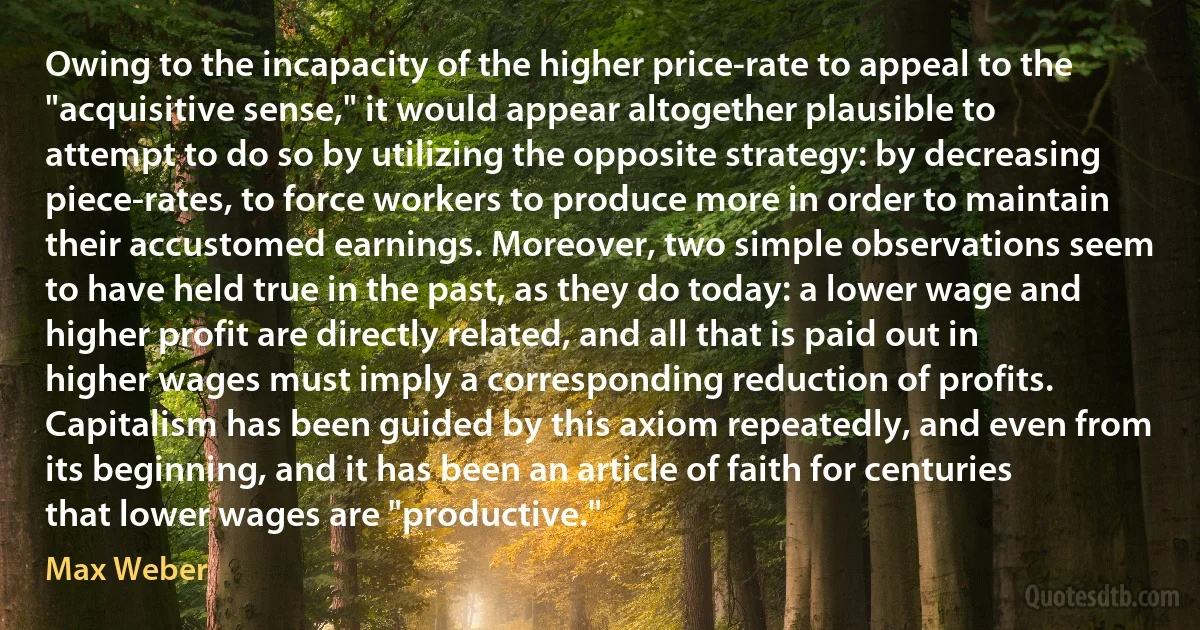
Owing to the incapacity of the higher price-rate to appeal to the "acquisitive sense," it would appear altogether plausible to attempt to do so by utilizing the opposite strategy: by decreasing piece-rates, to force workers to produce more in order to maintain their accustomed earnings. Moreover, two simple observations seem to have held true in the past, as they do today: a lower wage and higher profit are directly related, and all that is paid out in higher wages must imply a corresponding reduction of profits. Capitalism has been guided by this axiom repeatedly, and even from its beginning, and it has been an article of faith for centuries that lower wages are "productive."
Max WeberRelated topics
appear article attempt axiom beginning faith force hold incapacity lower order past pay produce profit reduction sense simple wages today profits higherRelated quotes
[Y]ou have expressed my inward conviction, though far more vividly and clearly than I could have done, that the Universe is not the result of chance. ... Lastly, I could show fight on natural selection having done and doing more for the progress of civilization than you seem inclined to admit. Remember what risk the nations of Europe ran, not so many centuries ago of being overwhelmed by the Turks, and how ridiculous such an idea now is! The more civilized so-called Caucasian races have beaten the Turkish hollow in the struggle for existence. Looking to the world at no very distant date, what an endless number of the lower races will have been eliminated by the higher civilized races throughout the world.

Charles Darwin
All of our conscious states, without exception, are caused by lower level neurobiological processes in the brain, and they are realized in the brain as higher level, or system features. It's about as mysterious as the liquidity of water, right? The liquidity is not an extra juice squirted out by the H2O molecules, it's a condition that the system is in; and just as the jar full of water can go from a liquid to solid, depending on the behavior of the molecules, so your brain can go from a state of being conscious to a state of being unconscious, depending on the behavior of the molecules. The famous mind body problem is that simple.

John Searle
Advances in science when put to practical use mean more jobs, higher wages, shorter hours, more abundant crops, more leisure for recreation, for study, for learning how to live without the deadening drudgery which has been the burden of the common man for ages past. Advances in science will also bring higher standards of living, will lead to the prevention or cure of diseases, will promote conservation of our limited national resources, and will assure means of defense against aggression. But to achieve these objectives - to secure a high level of employment, to maintain a position of world leadership - the flow of new scientific knowledge must be both continuous and substantial.

Vannevar Bush
There is very good reason to believe that, in a generation or so, capitalism itself will no longer exist-most obviously, as ecologists keep reminding us, because it's impossible to maintain an engine of perpetual growth forever on a finite planet, and the current form of capitalism doesn't seem to be capable of generating the kind of vast technological breakthroughs and mobilizations that would be required for us to start finding and colonizing any other planets. Yet faced with the prospect of capitalism actually ending, the most common reaction-even from those who call themselves "progressives"-is simply fear. We cling to what exists because we can no longer imagine an alternative that wouldn't be even worse.

David Graeber
Slavery is useful for early accumulation of capital, but it is too rigid for industrial development. Slaves had to be given crude non-breakable tools which held back the capitalist development of agriculture and industry. That explains the fact that the northern portions of the U. S. A. gained far more industrial benefits from slavery than the South, which actually had slave institutions on its soil; and ultimately the stage was reached during the American Civil War when the Northern capitalists fought to end slavery within the boundaries of the U. S. A. so that the country as a whole could advance to a higher level of capitalism.

Walter Rodney
